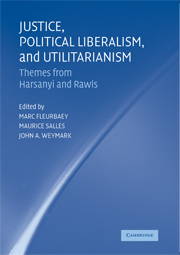Book contents
- Frontmatter
- Contents
- Preface
- List of Contributors
- 1 An Introduction to Justice, Political Liberalism, and Utilitarianism
- PART ONE THEMES FROM RAWLS
- PART TWO HARSANYI'S IMPARTIAL OBSERVER AND SOCIAL AGGREGATION THEOREMS
- PART THREE GOODNESS AND WELL-BEING
- PART FOUR SHARING THE GAINS FROM SOCIAL COOPERATION
- PART FIVE RIGHTS AND LIBERTIES
- 16 Republican Political Theory
- 17 Rule Utilitarianism and Liberal Priorities
- Index
17 - Rule Utilitarianism and Liberal Priorities
Published online by Cambridge University Press: 09 February 2010
- Frontmatter
- Contents
- Preface
- List of Contributors
- 1 An Introduction to Justice, Political Liberalism, and Utilitarianism
- PART ONE THEMES FROM RAWLS
- PART TWO HARSANYI'S IMPARTIAL OBSERVER AND SOCIAL AGGREGATION THEOREMS
- PART THREE GOODNESS AND WELL-BEING
- PART FOUR SHARING THE GAINS FROM SOCIAL COOPERATION
- PART FIVE RIGHTS AND LIBERTIES
- 16 Republican Political Theory
- 17 Rule Utilitarianism and Liberal Priorities
- Index
Summary
Introduction
Liberals typically claim that equal rights and liberties should have suitable moral priority over competing values. Rawls (1971, 1993), for example, argues that social justice properly limits permissible conceptions of the good life in a democratic culture and that, within justice as he conceives it, a first principle of equal basic liberties has absolute priority over a second two-part principle. Political rights are given a special place within his first principle, in that they (unlike other basic rights) must have roughly equal worth (or “fair value”) for all persons (1993, pp. 5–6, 324–331, 356–362). The rationale for this special treatment seems to be the allegedly essential role that exercise of the political liberties plays in “preserving the other liberties” (Rawls, 1993, p. 299). Thus, individuals must have a fair opportunity to exercise their basic political rights “because it is essential in order to establish just legislation and also to make sure that the fair political process specified by the constitution is open to everyone on a basis of rough equality” (Rawls, 1993, p. 330).
A major aim of Rawls in particular, and of liberal theorists more generally, has been to provide a more secure foundation than utilitarianism seems to provide for the suitable priority of equal basic rights. As Rawls puts it, the “first task” of his political theory is “to provide a more secure and acceptable basis for constitutional principles and basic rights and liberties than utilitarianism seems to allow” (1985, p. 226). It is open to doubt whether this “first” task has been accomplished by Rawls or any other antiutilitarian.
- Type
- Chapter
- Information
- Justice, Political Liberalism, and UtilitarianismThemes from Harsanyi and Rawls, pp. 411 - 434Publisher: Cambridge University PressPrint publication year: 2008
- 1
- Cited by

